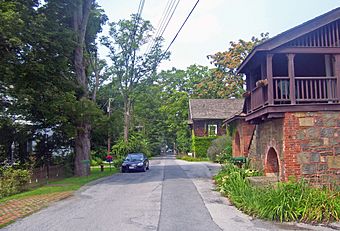Vanderbilt Lane Historic District facts for kids
Quick facts for kids |
|
|
Vanderbilt Lane Historic District
|
|

South portion of barn complex and superintendent's house, 2008
|
|
| Location | Hyde Park, New York |
|---|---|
| Nearest city | Poughkeepsie |
| Area | 10 acres (4 ha) |
| Built | 1830-1901 |
| Architectural style | Federal, Shingle |
| NRHP reference No. | 93000855 |
| Added to NRHP | 1993 |
The Vanderbilt Lane Historic District is a special area in Hyde Park, New York. It's located along Vanderbilt Lane, just east of US 9. This area was once part of a large farm that belonged to the famous Vanderbilt family.
The buildings here were used for farm work on the nearby Vanderbilt estate. Most of them were built around 1900. However, one building is much older, dating back to the 1830s!
Many of the original buildings and features are still here today. This district is one of the few old farm complexes on the east side of the Hudson River that hasn't been torn down. In 1993, it was added to the National Register of Historic Places. This means it's an important historical place worth protecting.
Contents
What Makes Up the District?
The Vanderbilt Lane Historic District covers about 10 acres (4 hectares). It includes several properties on both sides of the lane. In total, there are ten important historical features here.
These features include five buildings, one structure (a well), and three objects. The objects are a stone wall with a gate and two old fire hydrants.
A Look at the Land
Even though there are buildings, the area still feels like a peaceful countryside. The houses and other buildings are made of wood, stone, and brick. They are built in styles like Federal or Shingle.
There's plenty of space for big shade trees, green lawns, and pretty landscaping. Vanderbilt Lane itself is quite narrow. It feels more like a private driveway than a regular street.
Buildings on Vanderbilt Lane
On the north side of the lane, you'll find two main properties. One is the superintendent's house, a one-story building with wooden siding. The other is a barn complex, which was partly damaged by a fire a long time ago.
On the south side of the lane, there are three other buildings. These include a herdsman's house, a coach house with shingle siding, and a creamery.
History of Vanderbilt Lane
When Frederick Vanderbilt bought the estate in 1895, the farm buildings across the road were in poor condition. He decided to fix them up and build new ones.
The Oldest Building
The herdsman's house is the oldest building in the district. It was built in 1830 when Robert Langdon owned the property. This house is a rectangular building with a gabled roof. It's the only building here that was around before Vanderbilt bought the land.
New Buildings and Designs
Vanderbilt had new buildings constructed on the north side of the lane. We don't know the exact architect. However, it's very likely he hired the famous firm McKim, Mead & White. They had designed his mansion and another house nearby. These new buildings were finished in 1901.
The buildings designed by this firm are special because of their mixed textures. The barn complex, for example, uses many features of the Shingle style. This includes wood shingle siding, round towers, and stone ends. The superintendent's house also uses a lot of visible wood.
The creamery, located across the street, is one of the most unique buildings. It's made of stone with a sloped roof covered in wood shingles. A brick chimney sticks out from the roof.
Moving the Coach House
In 1905, Vanderbilt had the coach house moved. It was originally part of a nearby estate. He moved it in two pieces to its current spot. He used this building to keep his Belgian thoroughbred horses.
After Vanderbilt
Frederick Vanderbilt passed away in 1938. His niece later decided to give the mansion to the U.S. government. At that time, the Vanderbilt Lane properties were separated from the main estate. They were divided into smaller lots.
All the buildings were eventually turned into homes. They have not been changed much since then.
 | Toni Morrison |
 | Barack Obama |
 | Martin Luther King Jr. |
 | Ralph Bunche |



